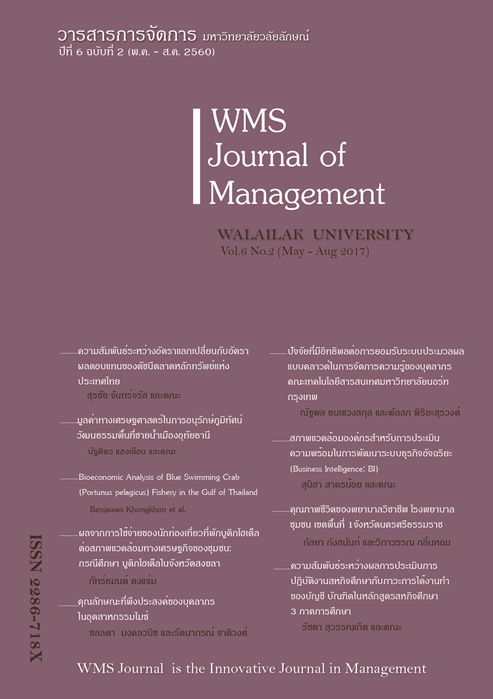The Relationship between Cooperative Education Performance Evaluation and Employment Status of Accounting Graduates in Three-Semester Cooperation Education Curriculum
Main Article Content
Abstract
The purpose of this study is to: 1) study characteristics of students after completing cooperative education, 2) their employment status before and after graduation, and 3) the relationship between characteristics of students after completing cooperation education and employment status before and after their graduation. The samples for data collection were 35 accounting graduates who graduated in 2015 (BE 2558) from the curriculum that sets three times of cooperation education in three semesters from Walailak University by using a cooperative evaluation form and questionnaire for graduates. The statistics for analyzing the data were frequency, percentage, mean, and Chi-square.
The results indicated that 1) the characteristics of the majority of the students were very good and excellent with the highest score for personal characteristics and the lowest score (but still in the fair range) for language skills; 2) most graduates could get a job before graduation (62.86%) and within three months after graduation (14.29%), altogether 77.14%, which is considered very high; and 3) the relationship between characteristics of students after completing cooperation education and employment status before and after their graduation was consistent in that most of the evaluation score from the first cooperative education except workload did not correspond to employment whereas that from the second and third cooperative education was more correlated with employment. The characteristic which mostly led to employment both before and after graduation was knowledge and competency.
Article Details
References
คณะกรรมการอุดมศึกษา. (2553). ประกาศกระทรวงศึกษาธิการ เรื่อง มาตรฐานคุณวุฒิระดับปริญญาตรี สาขาวิชาการบัญชี พ.ศ.2553. สืบค้นเมื่อ 1 ตุลาคม, 2559,สืบค้นจาก http://www.mua.go.th/ohec/.
บุญธรรม กิจปรีดาบริสุทธิ์. (2553). สถิติวิเคราะห์เพื่อการวิจัย. พิมพ์ครั้งที่ 5. กรุงเทพฯ: เรือนแก้ว การพิมพ์.
วรรณภา ลือกิตินันท์ม พัชนี นนทศักดิ์ และพัทธนัย เสาะแสวง. (2558). ผลของการจัดสหกิจศึกษาที่มีต่อระยะเวลาการได้งานและรายได้ของบัณฑิตสหกิจศึกษา มหาวิทยาลัยบูรพา. วารสารเทคโนโลยีสุรนารี, 9(2), 101-117.
วิจิตร ศรีสอ้าน และคณะ. (2552). ประมวลสาระชุดฝึกอบรมสหกิจศึกษา. พิมพ์ครั้งที่ 2. สำนักงานคณะกรรมการอุดมศึกษาและสมาคมสหกิจศึกษาไทย.
ศูนย์สหกิจศึกษาและพัฒนาอาชีพ มหาวิทยาลัยวลัยลักษณ์. (2556). แบบประเมินผลการศึกษานักศึกษาสหกิจ. สืบค้นเมื่อ 1 ตุลาคม, 2559, สืบค้นจาก http://coop2.wu.ac.th/.
ศูนย์สหกิจศึกษาและพัฒนาอาชีพ (2556). แนะนำสหกิจศึกษา. สืบค้นเมื่อ 15 พฤศจิกายน 2559, สืบค้นจาก http://coop.wu.ac.th/?page_id=162.
สภาวิชาชีพบัญชี ในพระบรมราชูปถัมภ์. (2550). มาตรฐานการศึกษาระหว่างประเทศสำหรับผู้ประกอบวิชาชีพบัญชี ฉบับที่ 3 เรื่อง ทักษะทางวิชาชีพ. สืบค้นเมื่อ 1 ตุลาคม, 2559, สืบค้นจาก http://www.fap.or.th/.
Accounting Education Change Commission (Fall 1990). Objectives of Education for Accountants: Position Statement Number One. Issues in Accounting Education, 5(2), 307-312.
Beard. (1998). The status of internships/ cooperative education experiences in accounting education. Journal of Accounting Education, 16(3-4), 507-516.
Cullen. (2005). Environmental science cooperative education: benefits for the student, the host organization, and the study program. Asia-Pacific Journal of Cooperative Education, 6(2), 5.
Gault, Redington, Schlager. (2000. Undergraduate business internship and career success: Are they related?. Journal of Marketing Education, 22(1), 47-51.
Rigsby, Addy and Herring. (2013). An examination of internships and job opportunities. The Journal of Applied Business Research, 29(4), 1137.
Siegel, G., & Sorensen, J. (August, 1994). What Corporate America Wants in Entry-Level Accountants?


